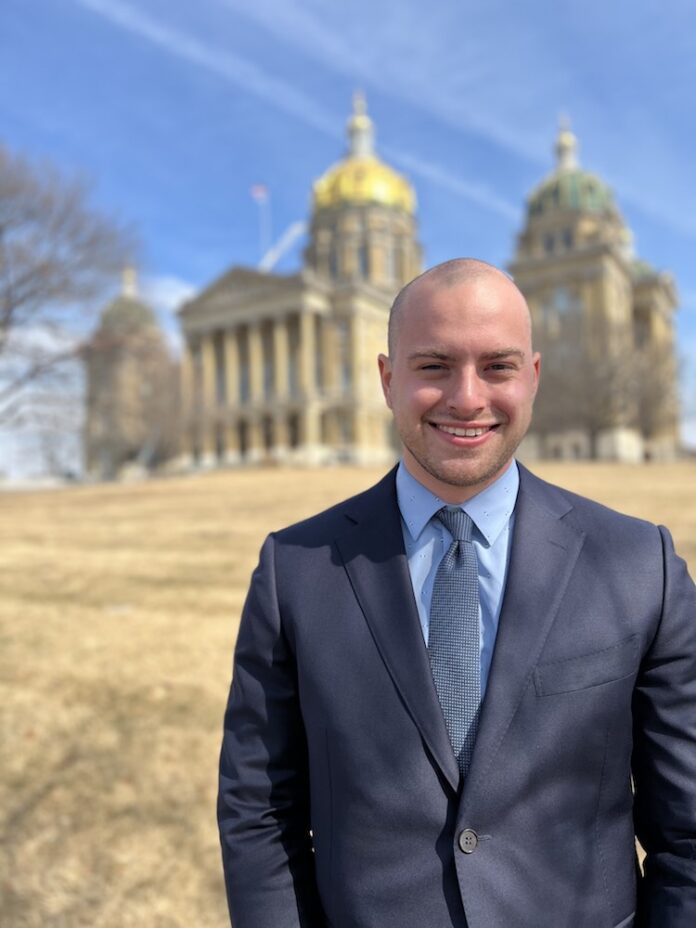ATLANTA: Sami Scheetz, a 25-year-old community organizer, is set to become the first Arab American member of Iowa state legislature in elections due to be held in November.
The Democrat is running unopposed in the 78th district, which means he is all but guaranteed to make history in state politics by taking a seat in the General Assembly.
Scheetz is no stranger to state and national politics. He told Arab News from his home town of Cedar Rapids that he has worked for the past 10 years on political campaigns for Democratic candidates on the state and national levels. He gained his political experience from organizing community activities and working for the presidential campaigns of Bernie Sanders and Joe Biden. He also helped with a Democratic gubernatorial campaign in Iowa in 2018.
When he takes his seat in the Iowa legislature, Scheetz said that he will work to promote increased diversity and inclusion in state politics. The key issues he intends to focus on include improving the education system and advocating for the introduction of universal healthcare to ensure every person has proper access to medical treatment.
“Education, healthcare and workers’ rights are my three main causes,” he said.
The current representative of the 78th district is Republican Jarad Klein, who has held the seat for 11 years but decided not to seek reelection this year.
Iowa’s General Assembly is currently controlled by a Republican majority. The 78th district has a diverse electorate that includes large Latino, Arab American and African American communities. Scheetz said he will represent all residents of his district equally and work to improve their living standards.
He pointed out that ethnic and racial minority groups in the district have historically lagged behind whites in terms of involvement and participation in the political process.
“The Arab and Latino and all of other communities have as much interest and stake in the political process but they don’t participate at the same level, or even close to the same level, as their white counterparts,” he said.
Scheetz added that he will work to change the political culture by pushing for more inclusion and a greater degree of political integration of minority groups.
He said he will draw from the experience he gained working on the Sanders presidential campaign, which established satellite caucuses in various areas to encourage first-time and reluctant voters, in particular immigrants and especially those from the Arab American, Latino and African American communities.
“This is the smart thing to do for the Democratic party,” he added.
Scheetz’s mother, Hala, immigrated to the US from Damascus, Syria, more than 35 years ago, and his father, Raphael, is a native born Iowan with German heritage.
He said he is very proud of his Arab American heritage and will ably represent this community in his district and the wider state. He is fluent in Arabic, as well as Spanish.
Iowa has a sizable Arab American community that began to establish itself more than a century ago. The state is home to the Mother Mosque of America, which was the first mosque to be built in US and opened in 1934.
The exact number of Arab Americans in the state is difficult to measure accurately because there is no specific category for them on the national US census and so their only option for describing their racial and ethnic origin is “white.”
According to the Arab American Institute in Washington, an organization that works to increase the participation and representation of this community in US politics, more than 17,000 Arab Americans lived in Iowa in 2017. Recent crises and conflicts in the Middle East have resulted in fresh waves of Arab and Muslim immigrants. A large community of Iraqi refugees have settled in Des Moines, Iowa’s largest city and its capital, for example.
Other states in the Midwest, including Illinois, Wisconsin and Minnesota, have large Arab American populations numbering in the hundreds of thousands. Overall, the AAI estimates that there are at least 3.7 million people with Arab heritage living in the US.

